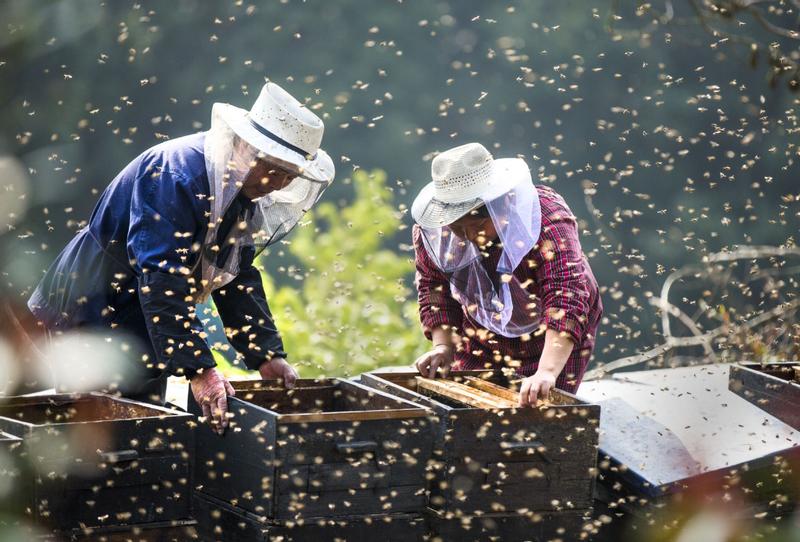 Beekeepers work on hives in Jiujiang, Jiangxi province, on March 5, 2020. As flowers begin to bloom, they have been busy raising bees and collecting honey. (FU JIANBIN / FOR CHINA DAILY)
Beekeepers work on hives in Jiujiang, Jiangxi province, on March 5, 2020. As flowers begin to bloom, they have been busy raising bees and collecting honey. (FU JIANBIN / FOR CHINA DAILY)
With spring planting on track and with sufficient supplies of agricultural materials such as seeds and fertilizers, China is confident it can fulfill its grain production goal despite the impact of the novel coronavirus, the Ministry of Agriculture and Rural Affairs said on Thursday.
Meanwhile, domestic hog production is expected to be restored to normal levels this year as the spread of African swine fever slows and authorities overcome staff shortages to enforce animal disease control work, the ministry added.
To address excess production of aquatic products, the ministry has also rolled out supportive policies to spur the development of fish processing and stock up on fish seedlings, according to the ministry.
To alleviate the impact of the epidemic on spring planting, we have been focusing on advancing resumption of factories producing key agricultural materials, removing hurdles in supplies of these products and machineries and helping farmers return to their fields.
Pan Wenbo, Head of crop production department, Ministry of Agriculture and Rural Affairs, China
China has implemented wide-ranging measures to restrict transportation and people's movement in a bid to control the spread of the novel coronavirus. As a result, different sectors of the country's agricultural industry have to cope with disrupted market chains and trade, shortages of staff and materials, shuttered businesses and dwindling consumption.
"To alleviate the impact of the epidemic on spring planting, we have been focusing on advancing resumption of factories producing key agricultural materials, removing hurdles in supplies of these products and machineries and helping farmers return to their fields," said Pan Wenbo, head of the ministry's crop production department.
ALSO READ: Xi emphasizes full effort on food security
According to Pan, grain planted during this time accounts for more than half of the country's total acreage, spanning about 60 million hectares.
During normal times, supplies of seeds, fertilizers and pesticides would exceed national demand, said Zhang Yanqiu, head of the ministry's seed management department. However, the supply chain has been cut off due to halted transportation across regions.
The ministry has thus created a green channel to ensure that vehicles delivering agricultural materials will be exempt from inspections or toll fees. At present, major transportation routes and 78 percent of rural roads linking key producing regions have been connected, Zhang said.
In addition, the majority of seed or fertilizer manufacturers have resumed production, and 78 percent of retailers surveyed by the ministry have also restarted business, he added.
Pan said, "The pace of spring farming at present is roughly aligned with previous years. We have also laid a good foundation for a bumper summer harvest, and enthusiasm among farmers is stable. So we are confident in achieving the grain production goal this year."
In the livestock sector, Yang Zhenhai, head of the ministry's husbandry and veterinary bureau, said the number of outbreaks of African swine fever is significantly smaller this year, and the epidemic situation of bird flu is steady.
"We have reported just one outbreak of the pig disease as of recently, down from 12 outbreaks last year," he said."Also, we have detected four cases of avian flu in wild birds and two cases in domesticated poultry this year, which is similar to previous years.
"Even though the novel coronavirus epidemic has caused personnel shortages and limited animal disease control work, local authorities have been asked to overcome these obstacles, to refine their work and guarantee sustained development of the livestock sector."
READ MORE: Battered animal industry needs support
According to Yang, inventories of breeding sows have increased for four consecutive months, up by eight percent from September. The ministry will continue to smooth out the industrial chain and issue financial incentives to breeding farms.
In terms of aquatic products, Zhang Xianliang, chief of the ministry's fishing industry and administration department, said major breeding projects have been launched successively across China. However, backlogs of fishing products have been noted in some regions due to the epidemic.
"To solve the issue, we are urging processing plants of aquatic products to resume operations, ramp up production of fish seedlings, accelerate maintenance and renovation of breeding facilities and step up efforts in controlling pests," he said.
Zou Shuo and Yang Wanli contributed to this story.


